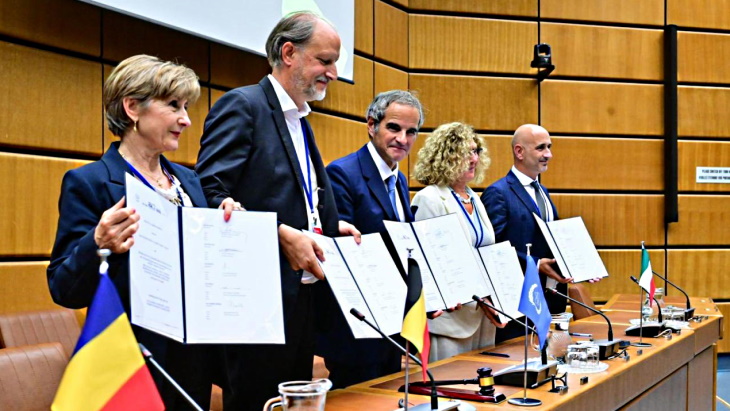In the face of growing climate goals and the need for reliable low-carbon energy sources, Small Modular Reactors (SMRs) are gaining traction as a promising solution. Europe has recently taken a significant step forward: the nuclear regulatory authorities of Belgium, Italy, and Romania have jointly launched an international pre-licensing assessment for the EAGLES-300 lead-cooled Generation IV SMR design. This move not only aims to accelerate certification for the design but also sets a precedent for standardisation and regulatory harmonisation in SMRs across Europe and beyond.

(Image: SCK-CEN)
EAGLES-300 is a project conceived by the Eagles Consortium, developing a lead-cooled fast neutron SMR with an electrical output of about 300 MWe. The consortium includes ENEA and Ansaldo Nucleare (Italy), SCK-CEN (Belgium), and RATEN (Romania). Beyond electricity generation, the design is tailored for industrial heat and hydrogen production. Its modular nature is intended to reduce upfront investment and shorten construction times.
Pre-licensing is a structured early dialogue between developers and regulatory bodies, before a formal licensing application is submitted. Especially for advanced technologies like lead-cooled reactors:
· It enables identification of safety, regulatory, or licensing challenges at the design phase, reducing later redesigns or regulatory delays.
· It facilitates standardised designs across borders, helping avoid redundant reviews and improving efficiency.
· For investors, it improves predictability; for regulators, it provides more time to evaluate novel technologies comprehensively.
· Regulatory partners: FANC (Belgium), ISIN (Italy), CNCAN (Romania).
· Signing date and place: 15 September 2025 in Vienna, during the IAEA General Conference.
· Driving organisations: The Eagles Consortium, formally established mid-2025, aims for a demonstrator by 2035 and broader commercial deployment around 2039.
This effort aligns closely with the European Industrial Alliance on SMRs, which has set goals to facilitate demonstration and deployment of SMR projects in Europe in the early 2030s.
Moreover, as a pilot under the IAEA' s Nuclear Harmonisation and Standardisation Initiative, EAGLES-300’s pre-licensing will provide useful frameworks and lessons for future SMR projects involving multiple jurisdictions.
To achieve its goals, EAGLES-300 must surmount several hurdles:
Technical validation and material durability – lead-cooled fast reactors pose particular challenges for coolant corrosion, material fatigue, and performance under high-temperature service.
Regulatory differences across countries – standards for nuclear safety, waste handling, accident scenarios, and licensing vary; standardisation needs to accommodate such divergence.
Cost and investment management – though modularity promises lower per-unit cost, the first demonstration unit still carries high cost and risk.
Public acceptance and social licence – safety concerns, environmental concerns, waste management, and accident risks remain prominent; transparency and trust are essential.
The launch of the pre-licensing process for EAGLES-300 signals more than the advancement of a single project – it represents the emergence of a structured, standardised approach to SMRs in Europe. If successful, it will pave the way for more predictable licensing, greater technical robustness, and stronger international cooperation and deployment of SMR technologies globally.